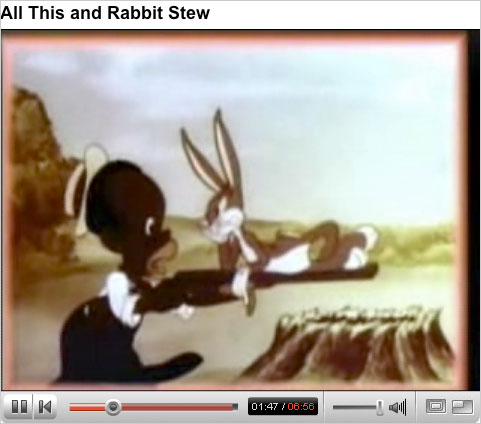 Eleven Warner Bros. cartoons that have been under lock and key for the past four decades due to their highly racist and stereotypical content recently surfaced on YouTube and now everyone is in a tizzy over what to do with them.
Eleven Warner Bros. cartoons that have been under lock and key for the past four decades due to their highly racist and stereotypical content recently surfaced on YouTube and now everyone is in a tizzy over what to do with them.
The “classic” videos include such gag/anger inducing titles such as ‘Tokio Jokio’ and ‘Coal Black and de Sebben Dwarfs’ and several were created (not surprisingly) as war propaganda during WWII. Many, including the NAACP, are calling for the videos to be returned to the vault while YouTube/Google are less inclined to pull the videos unless Warner Bros comes forward to claim copyright infringement.
A representative for Warner wrote in an e-mail message that “Warner Brothers has rights to the titles” in question and that “we vigorously protect all our copyrights. We do not make distinctions based on content.”
The cartoons, known as the “Censored 11,” have been unavailable to the public for 40 years. Postings no longer appear if YouTube is searched for “Coal Black and de Sebben Dwarfs,” a parody of “Snow White” and the most famous of the cartoons. But a search for “Coal Black” does find the cartoon.
Considering the viral nature of media these days, even if YouTube were to pull ever version of the offending cartoons it’s unlikely that they’ll truly disappear…so the argument is pretty much moot. But here’s the real interesting question that I pose to all you readers…and the real issue that I believe is at the heart of this controversy. How should we (as a collective society) deal with our racial history and all the artifacts that come along with it? Do we bury the offending materials and pretend they never existed or do we inject the materials into the ongoing public dialogue about race and racism in America? Personally, I’m for an honest examination of race in this country – even if that means making these videos publicly available.
Obviously Warner Bros. wants nothing more than these videos to disappear. But beyond that, what good is yielded from ignoring the existance of these cartoons? They were apart of our country’s history and a telling clue to how horrifyingly racist this country once was and, some might argue, still is. Critics will argue that these cartoons, when taken out of context and viewed without proper guidance, may serve as fooder for and exploited by racial supremisists and other seperatist groups.
What do you think?








